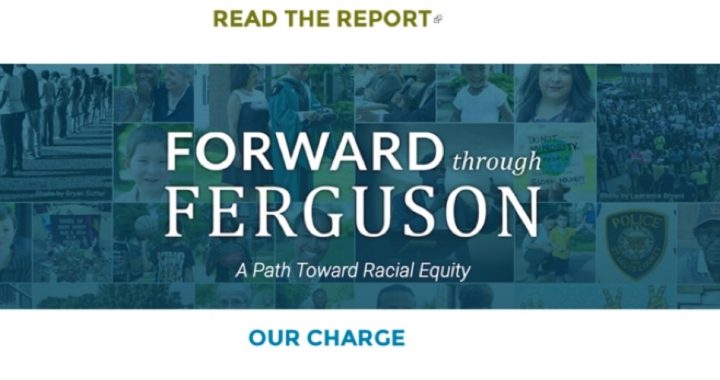
Missouri Governor Jay Nixon’s “Ferguson Commission” has released its report, which includes 198 “calls to action.” The most important of those “calls” involve the commission’s recommendations for police departments and municipal courts to be merged into regional police departments and regional courts.
According to the commission’s website, “The Ferguson Commission is an independent group appointed by Missouri Governor Jay Nixon on November 18, 2014, to conduct a ‘thorough, wide-ranging and unflinching study of the social and economic conditions that impede progress, equality and safety in the St. Louis region.'” The commission was formed by the governor in the wake of riots and unrest following the shooting death of Michael Brown. It can make recommendations, but it has no authority to enforce them.
Ferguson police officer Darren Wilson shot and killed Brown on August 9, 2014. The shooting sparked protests and riots spreading from Ferguson to the rest of the country and led to increased interest in the “Black Lives Matter” campaign, which has called for the murder of police officers and white people.
Initial reports — which have since been shown to be false — were that Officer Wilson shot Michael Brown even though Brown was surrendering and had his hands in the air. As Deputy Chief of Police Tracy Basterrechea in Meridian, Idaho, told The New American, once erroneous information gets out — and the media run with it — people find it difficult to believe the actual truth:
You have to try to get the [complete] information out first because when the misinformation gets out, that’s the information that sticks. That is what happened in the Ferguson shooting. The misinformation got out and was the first thing people saw, and so it became “the gospel.”
What was not initially reported — and was largely ignored by most media even after the facts were known — is that Brown and and an accomplice had just robbed a convenience store of several packs of small cigars, assaulting a clerk in the process. When Officer Wilson saw them walking down the street, he recognized them from the description of the suspects. He blocked them with his police SUV and Brown then reached into the open window to attack the officer. Brown and Wilson struggled for Wilson’s sidearm until it was discharged inside the SUV. Brown and his accomplice, Dorian Johnson, ran away, and Wilson pursued them on foot. Brown then turned and charged toward Officer Wilson, who ordered Brown to stop. When he did not, Officer Wilson shot him several times.
Because of the widespread reporting of false information, the Ferguson shooting became a springboard for anti-police sentiment. It was seen as a clear case of racism: A white police officer shot an unarmed black “teenager.” The mainstream media and the “Black Lives Matter” crowd never mentioned that it could have been self-defense. White cop, black “teenager”: racism. The facts were not allowed to get in the way of the narrative.
However, when a grand jury heard testimony from witnesses and examined all the forensic evidence, it declined to indict Officer Wilson. A federal investigation by the Department of Justice also cleared the officer. Cue the riots. And cue the pressure for state and federal intervention in the affairs of local police. The Ferguson case has been a classic power play involving pressure from above and pressure from below, with local police caught in the middle.
In response to the riots, Governor Nixon empaneled the Ferguson Commission to conduct a “thorough, wide-ranging and unflinching study of the social and economic conditions that impede progress, equality and safety in the St. Louis region.” If it sounds political, that is because it is.
Now the commission has published its report, in which it states, “Make no mistake: This is about race.” The report claims that blacks are unfairly targeted for everything from traffic stops to fines to court costs to arrests. The solutions? Merge police departments into larger regional police departments and merge courts into larger regional courts. Restrict police ability to use force. Raise the minimum wage. Create better educational and transportation and job opportunities.
Apparently, when it comes to government, bigger is better. In reality, the report’s recommendations are so pie-in-the-sky that even many on the far Left think it is asking too much. As takepart.com reports:
From recommending that the minimum wage be raised to $15 an hour to calling for a better public transit system to consolidating the 81 municipal courts in the St. Louis area, the report is nothing if not ambitious. The primary focal points include citizen-law enforcement relations, child well-being and education equity, economic inequity and opportunity, and racial equity and reconciliation.
It is so broad-reaching in its recommendations — featuring 189 “calls to action” — that some in the community have questioned its practical impact. The recommendations seem more likely to be embraced in St. Louis County, which is 24 percent African American and mostly Democratic, than in the rest of the state, where Republicans hold six of the state’s other seven seats in Congress.
Of course “some in the community have questioned its practical impact.” The most incredible part of the report is that anyone thinks it can be done without the federal government stepping in and taking over. The danger here is to local police and their ability to remain local police. The big government trend toward first regionalizing, then nationalizing local police is a very real threat to liberty. In Ferguson, that idea has found a manufactured crisis to latch on to.
The report makes a point of the fact that in St. Louis County, there are 81 municipal courts and 60 municipal police departments and argues that this creates a situation that is “not only costly and a grossly inefficient use of taxpayer resources, but more importantly presents as an impediment to justice for many of our region’s citizens.”
To be sure, there are problems in Ferguson, but they are local problems and must be dealt with locally. If the police and courts are regionalized, things will assuredly only get worse.
When police arrived on the scene to begin investigating the shooting of Michael Brown, they were met with an angry mob who had already passed judgment. The investigation was hindered by people interfering and disturbing the scene. Shots were heard in the area. The original testimony of “witnesses” that Officer Wilson had shot Michael Brown while he was surrendering, were later retracted and many of the purported witnesses admitted they were only repeating what they had read or heard from others.
All over the nation, police have had to deal with the so called “Ferguson factor,” hesitating to use force — even when it may be necessary — for fear of being the next Officer Darren Wilson. As Officer Luke Luther from as far away as the small town of Omro, Wisconsin — which has a population of about 3,500 — told The New American, he feels that the Ferguson factor has created a situation where “a lot of people may have jumped to conclusions before all the facts were known,” adding, “A lot of them believed ‘facts’ that weren’t actually facts. It definitely makes me think a little more, and it might slow me down in certain things.”
Art Thompson, the CEO of The John Birch Society, the parent organization of this magazine, has stated,
Our system of local police, responsible to the local citizens, is unique in the world. Most countries have a system of national police whose first loyalty is to the national government.
Our system is one of the cornerstones of liberty.
America is great due to our system of liberty and the fact that our government is more localized and closer to the people, including police authority. In the United States, the power comes from the bottom up, from the people. Elsewhere it is more from the top down, from the bureaucrats, controlling nearly every aspect of the citizens’ lives, work, industry, and law enforcement.
Actually, the United States is one of the last countries … to have widespread local police power instead of the types of national systems that exist elsewhere. No country can become totalitarian as long as the local citizens have direct responsibility for and control of local police departments. It is one of our essential checks and balances.
There are those who want to change our American system into something resembling the rest of the world. In the process, they want to remove responsibility from the citizens and the ability of the local police departments to answer to the local citizens through their city government, becoming nothing more than units in a national police force.
The Society’s almost 50-year campaign to “Support Your Local Police and Keep Them Independent” is aimed at educating citizens about this important key to liberty.




